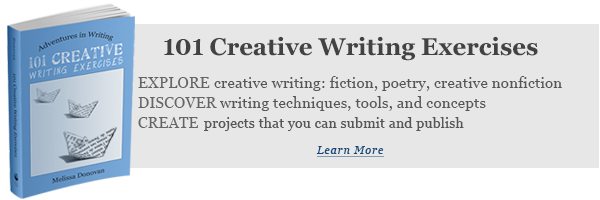Today’s post is an excerpt from 101 Creative Writing Exercises. This exercise is called “Quoteworthy.” It’s from “Chapter 4: Speak Up.” Enjoy!
Quoteworthy
One of the greatest achievements a writer can make is writing prose that is quoteworthy. Many great lines and slang words or phrases have come to us from plays, books, poems, and movies.
In Star Wars, every so often, one of the characters says, “I’ve got a bad feeling about this.” Every time someone says that, they’re about to face a conflict. Those characters are awfully intuitive! This line caught on with the public. Star Wars fans grew up and became writers, and in tribute to their favorite movie, they might have one of their characters say, “I’ve got a bad feeling about this” right before something bad is about to happen.
Every generation has its memorable quotes. In the nineties, Forrest Gump told us, “Life is like a box of chocolates: you never know what you’re going to get.” In the eighties, Top Gun gave us “the need for speed.” Even today, most people are familiar with a quote from the 1939 film Gone with the Wind: “Frankly my dear, I don’t give a damn.”
Quotes from novels are less likely to become famous than quotes from movies, probably because we’ll watch a good movie over and over (heck, it’s only two hours), many more times than we are inclined to read a book—even a book we love. Yet hundreds of years after his death, Shakespeare’s most memorable lines are widely known:
- Romeo, Romeo, wherefore art thou Romeo?
- What’s in a name? That which we call a rose / By any other name would smell as sweet;
- Parting is such sweet sorrow…
These are all from just one play by William Shakespeare (Romeo and Juliet).
The Exercise
Come up with a list of three to five catchy and memorable lines or bits of dialogue. Wait—that’s not all. You also have to provide context. It’s not enough that Rhett Butler says “Frankly my dear, I don’t give a damn.” What matters, what makes the quote so memorable, is that he says it as he walks away from the woman he loves, and in that line, Rhett has finally given up on her (and given her up). It’s a moment. Your quoteworthy lines have to be placed in pivotal moments.
Tips: Context is everything. If you establish a situation before you develop your quoteworthy lines, this exercise will be much easier. Start the exercise by placing your characters in a situation.
Variations: If you find yourself sitting there for over an hour, and you haven’t come up with anything you think is quoteworthy, do not give up! Instead, set a goal to find three to five quoteworthy lines in the next few novels you read.
If that proves to be too much, then look for quoteworthiness in movies and TV shows. However, don’t include quotes that are already famous.
Applications: The purpose of this exercise is not to push you to write dialogue that everyone runs around quoting and repeating. The purpose is to think about dialogue as an opportunity to 1) give your characters strong and memorable voices, and 2) make the narrative punchier and more captivating.





